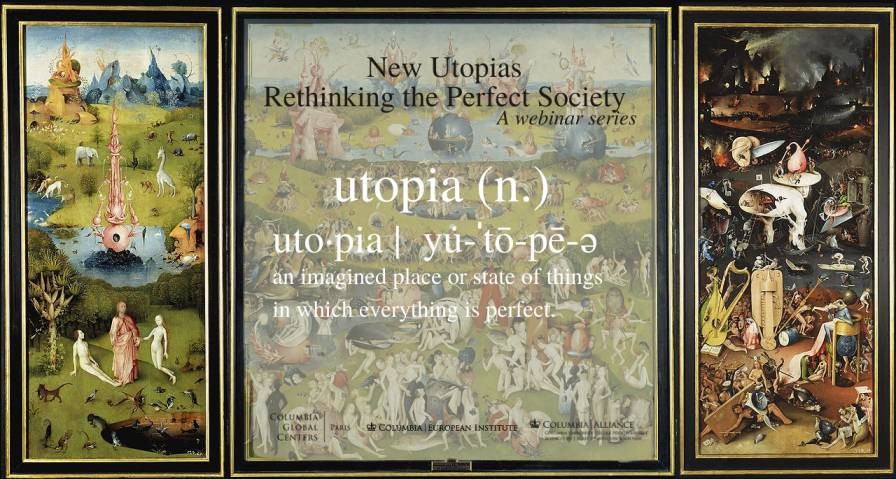New Utopias: Can We Heal the Wounds of the Past?

VIRTUAL EVENT | 12:30 p.m. (New York) | 6:30 p.m. (Paris)
Recent debates over racism and inequality highlight the enduring impact of past wrongs and historical injustices on social relations today. Instances of police and civic violence on both sides of the Atlantic demonstrate how prejudice still runs deep, despite the progress achieved by civil rights advocates since the 1960s. A renewed focus on systemic racism reveals the degree to which the legacy of prejudice and discrimination continues to shape political institutions and power relations today. At the same time, in recent years, we have witnessed many efforts aimed at reconciling with the past: from museums and commemorations to school curricula and artistic productions. We must ask ourselves if our societies will fully come to terms with their violent past. What are the long-term effects of racism on human behavior and social structures? How can the trauma of discrimination be overcome? How can societies rebuild trust with communities that have suffered and continue to suffer egregious injustices? How can we move beyond simply acknowledging the past to rebuilding a sense of common purpose among the many groups that constitute our societies?
In order to address these questions, the Columbia Global Centers | Paris, the European Institute, and the Alliance Program with co-sponsorship from Columbia Maison Française have brought together an international panel of experts to propose diverse perspectives on these issues.
Moderator:
Mirna Safi, Professor of Sociology, Sciences Po
Mirna Safi is a senior researcher at Sciences Po, internal affiliate at LIEPP, at OSC since 2007 and the member of CREST-LSQ laboratory. Her research interests include immigration, racial and ethnical inequalities, discriminations and segregations. Currently, she is working on the impacts of immigration on ethnoracial stratification within french society; anti-discriminatory policies at work and towards ethnic minority; residential mobility and location choice.
Panelists:
Soulaymane Bachir Diagne, Professor of French and Philosophy, Columbia University
Souleymane Bachir Diagne received his academic training in France. An alumnus of the École Normale Supérieure, he holds an agrégation in Philosophy (1978) and he took his Doctorat d’État in philosophy at the Sorbonne (1988) where he also took his BA (1977). Before joining Columbia University in 2008 he taught philosophy for many years at Cheikh Anta Diop University, Dakar (Senegal) and at Northwestern University. His field of research includes history of logic, history of philosophy, Islamic philosophy, African philosophy and literature. He is the author of African Art as Philosophy: Senghor, Bergson, and the Idea of Negritude (Seagull Books, 2011), The Ink of the Scholars: Reflections on Philosophy in Africa, (Dakar, Codesria, 2016), Open to Reason: Muslim Philosophers in Conversation with Western Tradition, (New York, Columbia University Press, 2018). His book, Bergson postcolonial. L’élan vital dans la pensée de Senghor et de Mohamed Iqbal, (Paris: Editions du CNRS, 2011) is forthcoming in an English version to be published by Fordham University Press. That book was awarded the Dagnan-Bouveret prize by the French Academy of Moral and Political Sciences for 2011 and on that same year professor Diagne received the Edouard Glissant Prize for his work. Souleymane Bachir Diagne’s current teaching interests include history of early modern philosophy, philosophy and Sufism in the Islamic world, African philosophy and literature, twentieth century French philosophy.
Sarah Gensburger, Research Professor in Political Science and History, CNRS
Sarah Gensburger's research interests are at the intersection of political science, ethnographic work and contemporary historiographic issues. She is interested in the social dynamic of memory. In her dissertation, she studied the process of remembrance through the title of Righteous among the Nations. Since, as a sociologist, professor Gensburger has been working on the memorialization process in the aftermath of terrorist attacks in Paris as well as on the social appropriations of the past by visitors at memorials and commemorative sites and exhibitions. As a social historian, she has been studying everyday life, housing issues and social networks in World War Two Paris, at the crossing of urban history and Holocaust history.
More recently, and as a political scientist, professor Gensburger has been studying the governmentality of memory and the way it has become a category of public intervention in Western democracies. In 2019, in this perspective, with Sarah Dybris McQuaid, she co-edited a special issue of the International Journal of Politics, Culture and Society untitled Administrations of Memory.
Courtney Cogburn, Associate Professor of Social Work, Columbia University
Associate Professor Courtney D. Cogburn employs a transdisciplinary research strategy to improve the characterization and measurement of racism and in examining the role of racism in the production of racial inequities in health. She is also conducting research exploring the use of emerging technologies, including computational social science to examine patterns and psychosocial effects of cultural racism and how virtual reality experiences can lead to changes in attitudes, social perception and engagement (empathy, racial bias, structural competence and behavior). Dr. Cogburn is the lead creator of 1000 Cut Journey, an immersive virtual reality racism experience that was developed in collaboration with the Virtual Human Interaction Lab at Stanford University and which premiered at the Tribeca Film Festival in 2018. She is on the faculty of the Columbia Population Research Center and a core member of the Data Science Institute where she also co-chairs the Computational Social Science working group. Dr. Cogburn is also a faculty affiliate of the Center on African American Politics and Society. She directs the Cogburn Research Group and co-directs the Justice Equity + Tech (JE+T) Laboratory at Columbia University. Dr. Cogburn completed postdoctoral training at Harvard University in the Robert Wood Johnson Health & Society Scholar Program and at the Institute for Social Research at the University of Michigan. She received her Ph.D. in Education and Psychology, and MSW from the University of Michigan and her BA in Psychology from the University of Virginia. She is also a board member of the International Center Advocates Against Discrimination..
